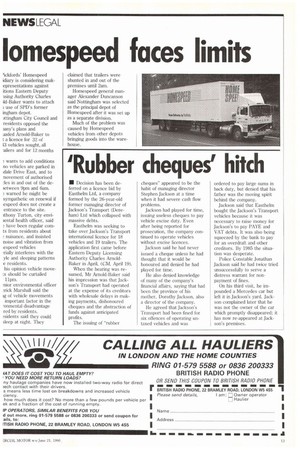'Rubber cheques' hitch
Page 13

If you've noticed an error in this article please click here to report it so we can fix it.
• Decision has been deferred on a licence bid by Easthelm Ltd, a company formed by the 26-year-old former managing director of Jackson's Transport (Dereham) Ltd which collapsed with massive debts.
Easthelm was seeking to take over Jackson's Transport international licence for 18 vehicles and 19 trailers. The application first came before Eastern Deputy Licensing Authority Charles ArnoldBaker in April, (CM, April 19).
When the hearing was resumed, Mr Arnold-Baker said his impression was that Jackson's Transport had operated at the expense of its creditors with wholesale delays in making payments, dishonoured cheques and the abstraction of funds against anticipated profits.
The issuing of "rubber cheques" appeared to be the habit of managing director Stephen Jackson at a time when it had severe cash flow problems.
Jackson had played for time, issuing useless cheques to pay vehicle excise duty. Even after being reported for prosecution, the company continued to operate vehicles without excise licences.
Jackson said he had never issued a cheque unless he had thought that it would be honoured and denied he had played for time.
He also denied knowledge of many of the company's financial affairs, saying that had been the province of his mother, Dorothy Jackson, also a director of the company.
He agreed that Jackson's Transport had been fined for six offences of operating untaxed vehicles and was ordered to pay large sums in back duty, but denied that his father was the moving spirit behind the company.
Jackson said that Easthelm bought the Jackson's Transport vehicles because it was necessary to raise money for Jackson's to pay PAYE and VAT debts. It was also being squeezed by the bank to pay for an overdraft and other creditors. By 1985 the situation was desperate.
Police Constable Jonathan Jackson said he had twice tried unsuccessfully to serve a distress warrant for nonpayment of fines.
On his third visit, he impounded a Mercedes car but left it in Jackson's yard. Jackson complained later that he was not the owner of the car which promptly disappeared; it has now re-appeared at Jackson's premises.
















































































